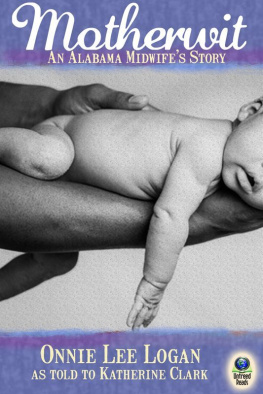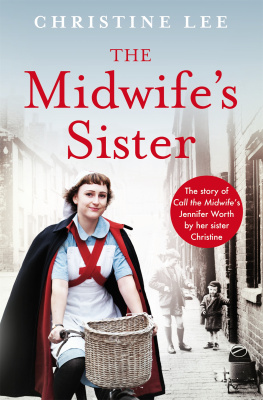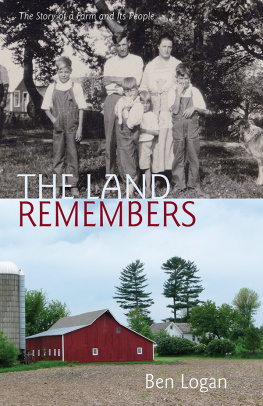Onnie Lee Logan - Motherwit: An Alabama Midwifes Story
Here you can read online Onnie Lee Logan - Motherwit: An Alabama Midwifes Story full text of the book (entire story) in english for free. Download pdf and epub, get meaning, cover and reviews about this ebook. year: 2013, publisher: Untreed Reads Publishing, genre: Detective and thriller. Description of the work, (preface) as well as reviews are available. Best literature library LitArk.com created for fans of good reading and offers a wide selection of genres:
Romance novel
Science fiction
Adventure
Detective
Science
History
Home and family
Prose
Art
Politics
Computer
Non-fiction
Religion
Business
Children
Humor
Choose a favorite category and find really read worthwhile books. Enjoy immersion in the world of imagination, feel the emotions of the characters or learn something new for yourself, make an fascinating discovery.
- Book:Motherwit: An Alabama Midwifes Story
- Author:
- Publisher:Untreed Reads Publishing
- Genre:
- Year:2013
- Rating:4 / 5
- Favourites:Add to favourites
- Your mark:
- 80
- 1
- 2
- 3
- 4
- 5
Motherwit: An Alabama Midwifes Story: summary, description and annotation
We offer to read an annotation, description, summary or preface (depends on what the author of the book "Motherwit: An Alabama Midwifes Story" wrote himself). If you haven't found the necessary information about the book — write in the comments, we will try to find it.
Motherwit: An Alabama Midwifes Story — read online for free the complete book (whole text) full work
Below is the text of the book, divided by pages. System saving the place of the last page read, allows you to conveniently read the book "Motherwit: An Alabama Midwifes Story" online for free, without having to search again every time where you left off. Put a bookmark, and you can go to the page where you finished reading at any time.
Font size:
Interval:
Bookmark:

Motherwit
An Alabama Midwifes Story
By Onnie Lee Logan as told to Katherine Clark
Copyright 2013 by Katherine Clark
Cover Copyright 2013 by Ginny Glass and Untreed Reads Publishing
The author is hereby established as the sole holder of the copyright. Either the publisher (Untreed Reads) or author may enforce copyrights to the fullest extent.
Previously published in print, 1989 and 1991.
This ebook is licensed for your personal enjoyment only. No part of this book may be reproduced in any form or by any electronic or mechanical means, including information storage and retrieval systems, without written permission from the publisher or author, except in the case of a reviewer, who may quote brief passages embodied in critical articles or in a review. If you would like to share this book with another person, please purchase an additional copy for each person you share it with. If youre reading this book and did not purchase it, or it was not purchased for your use only, then please return to your ebook retailer and purchase your own copy. Thank you for respecting the hard work of this author.
http://www.untreedreads.com
Onnies riveting story touches the heartstrings. My only criticism of this book is that it cannot go on and on. I loved it.
James Mellon, editor, Bullwhip Days: The Slaves Remember
A life well lived unfolds in this exuberant, unlettered telling of a midwifes story. In Logans rich, regional speech as she talks with Clark, a strong, faith-filled woman is heard; her eloquent memoir is vivid Americana.
Publishers Weekly
What makes this story special is its voice. Motherwit is an oral accounting told in the warm and compelling language of the rural South. It is not difficult to imagine sitting at the kitchen table while Ms. Logan peeled peaches for a cobbler and spoke just above a whisper about shotgun housesluminum washtubsand pumpin water outside.
New York Times Book Review
Its rare to find someone who loved her work as much as Mrs. Logan. For her, childbirth is lifes greatest miracle. Aint God beautiful? Makes me want to scream on how it all works. Motherwit is the beautiful offspring of her dedication to that miracle.
Atlanta Jounal Constitution
A rich story of black southern rural life.
Boston Herald
* * *
ONNIE LEE LOGAN practiced midwifery in Alabama from 1931 to 1984. She was the last lay midwife practicing in Mobile. She told her story to Katherine Clark, an English professor at the University of Alabama in Tuscaloosa.
Motherwit
An Alabama Midwifes Story
By Onnie Lee Logan as told to Katherine Clark
Therefore God dealt well
with the midwives: and the
people multiplied, and
waxed very mighty.
Exodus 1:20
Introduction
The work that follows is the text of an oral autobiography told to me by a black granny midwife in Mobile, Alabama, during August 1984. Many white Mobilians knew Onnie Lee Logan only as a maid who for many years was an integral part of a prominent familys household, and it was through these people that I came to know her. Onnie always regarded midwifery as her real lifes work, however, and the inspiration for this project came not from me, but from her overwhelming desire not to die with it, as she saidnot to die without sharing the wisdom and knowledge but especially the stories from her lifetime of experience. Onnie, a semiliterate woman with little formal education, told me she was gonna write this book if she had to scratch it out herself. I got so much experience in here that I just want to explode, she told me. I want to show that I knew what I knewI want somebody to realize what I am. Hers is the story not only of midwifery, but of her personal odyssey as a rural black woman determined to lead a life of meaning and fulfillment.
Onnie Lee Logan was born around 1910, the fourteenth of sixteen children in Sweet Water, Marengo County, Alabama. Like all her brothers and sisters before her, Onnie was delivered by a midwife. Indeed, in that year, one-half of all births in America were attended by unlicensed, untrained midwives. In Alabama, Onnies mother was one of these midwives. Onnies grandmother, who had been a slave on a nearby plantation, had also been a midwife. Inspired by the stories about her grandmother, by the example of her mother, and by the gospel of service her family instilled in her, Onnie decided as a young girl to become a midwife herself.
Lay midwives like Onnies mother and grandmother, known by the community as grannies, were simply women experienced in assisting other women during labor and childbirth. Midwifery began centuries ago and persevered through time as little more than the practice of childbearing women calling upon other women in their community to serve as birth attendants. Even in twentieth-century America, midwifery had not departed from its age-old origins. At the time when midwives were delivering one-half of all babies born in the United States, there were no training programs to educate midwives and no laws in any state to regulate their practice. Childbirth and midwifery both took place outside the realms of law and medicine.
Soon after 1910, when the United States discovered it had the third-highest infant and maternal mortality rates in the world, midwifery came under heavy attack. Doctors called for the elimination of midwives and the growth of obstetrics as the only way to impose standards for the care of pregnant women and newborns. They agreed the midwife should have no place in modern medicine, but also conceded that midwifery was a necessary evil until the practice of obstetrics became universal. While promoting the gradual abolition of all midwifery, they proposed for the interim a plan of midwife control and education.
By 1930, this plan was so well under way that only 15 percent of all births in America were attended by midwives, who were now regulated by laws and trained by boards of health in most states. Significantly, 80 percent of these midwives lived in the South, where physicians had always been extremely scarce and the population had the highest percentage of black, poor, and rural citizens. In 1915, for example, the progressive state of Massachusetts had been able to outlaw midwifery altogether. On the other hand, in 1919, Alabama was just passing its first law to regulate midwifery. Because of its unique cultural circumstances, the South was decades behind the rest of the country in establishing obstetrics for the care of all childbearing women. Midwifery became a Southern black phenomenon, and the South became the repository of the so-called midwife problem in America.
Each Southern state varied in its treatment of this problem. Alabamas 1919 law officially recognized midwifery and placed it under control of the county boards of health. At first, many counties did little more than register midwives. Gradually, a more complete system developed in the bureaus of child hygiene and public health nursing. Potential midwives received instruction from public health nurses; were given written examinations; were subjected to monthly inspections of their equipment bags, their person, and their homes; were required to attend monthly meetings; and were expected to comply with all the stipulations concerning equipment, uniform, and personal hygiene. In addition, they could attend only normal deliveries. Ten years after the passage of the law, the essentials of this system were intact in most counties in Alabama.
Nevertheless, doctors and health officials in Alabama as in other Southern states would never be happy with any midwife program. It was the Southern states, with their high rates for blacks, that were largely responsible for making the national infant- and maternal-mortality rates so high. The medical establishment in the South condemned the ignorant black granny midwife as the source of the problem and began to work diligently toward establishing universal obstetrical care for indigent and rural blacks and whites.
Font size:
Interval:
Bookmark:
Similar books «Motherwit: An Alabama Midwifes Story»
Look at similar books to Motherwit: An Alabama Midwifes Story. We have selected literature similar in name and meaning in the hope of providing readers with more options to find new, interesting, not yet read works.
Discussion, reviews of the book Motherwit: An Alabama Midwifes Story and just readers' own opinions. Leave your comments, write what you think about the work, its meaning or the main characters. Specify what exactly you liked and what you didn't like, and why you think so.











